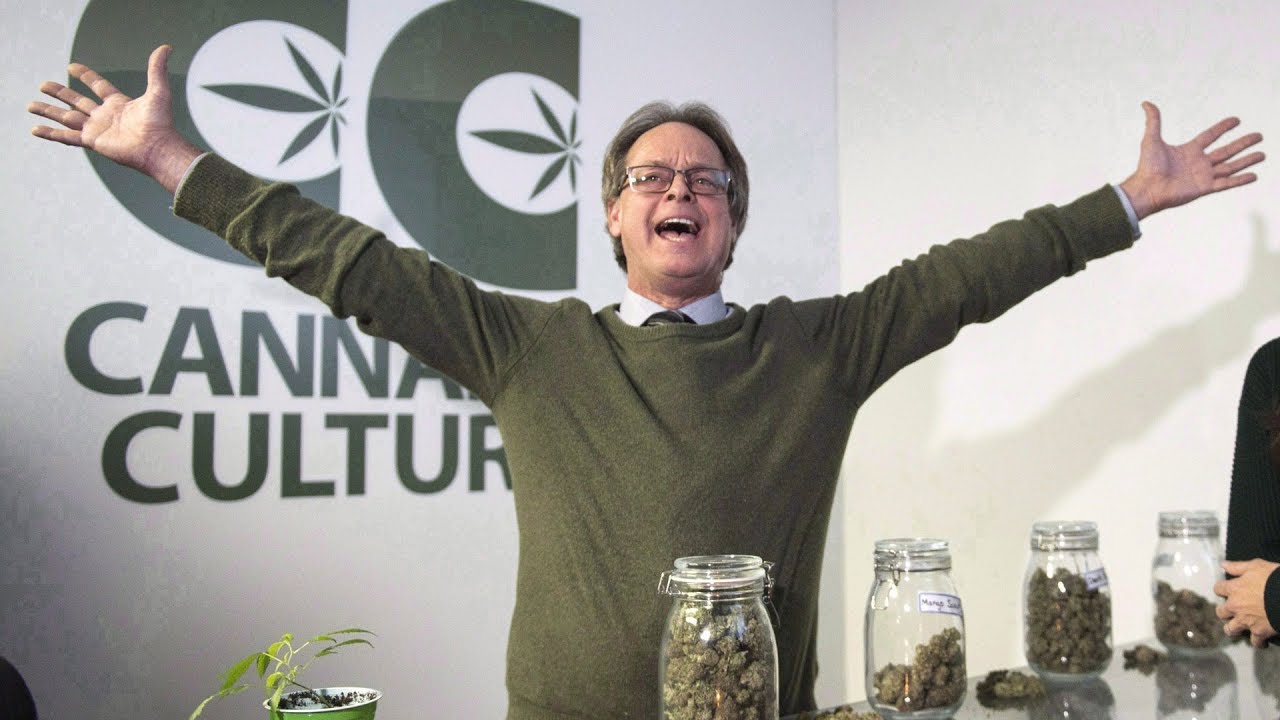The one thing that can be said about Marc Emery, the self-anointed Prince of Pot, is that he is and always has been an enigmatic figure in Canadian cannabis. To some he is a predator, who built a career for himself as the face of the legalization movement, and then leveraged that job to groom and exploit the labour of young women. To others, who have followed him for years, he is a martyr who has been persecuted by the state for his activism, and who has suffered nobly in the pursuit of making cannabis legal in Canada.
The accusations against him — ranging from supplying drugs to staff, hosting “lotion parties,” sexually harassing his employees, and grooming underage girls — were, as long-time pot activist Lisa Campbell calls them, an “open secret” in the cannabis world. For years, the basic bones of the story were circulated with the cannabis industry and media. Several media outlets in Canada — Vice, CANADALAND, and others — reportedly worked at various different times to break the story, but it never got the on-the-record sourcing that it required. On social media, Emery was called a “creep,” a “predator,” a “perv;” screenshots of his lewd posts on the Cannabis Culture forums were passed around, half as a plea for justice, and half to warn people about the man who had a knack for making sure legalization and his name were regularly mentioned in the same breath.
The transition from open secret to reported allegations was a quick one. Freelance journalist Deidre Olsen broke the dam open on January 4, with a Twitter thread detailing their own experience being “groomed” by Emery. A week later, another thread emerged, detailing the similar experiences that several people had had with him. The story was then reported in greater detail by HuffPost; Olsen’s own story was published in Leafly shortly after. And on January 29, Vice News published a 4,200-word expose, by now several years in the making, on his “creepy cannabis empire.”
It has all broken a simmering tension in Canadian cannabis. The “open secret” was finally out there, and on the record. “Everyone would talk about it, everyone knew about it,” Campbell told MERRY JANE. “But there’s a difference between it just being a rumour, and it making headlines.”
The flood of allegations, against the first household name in Canadian cannabis, has left many within the Canadian cannabis movement asking themselves how this could have gone on so long, and whether the fact that these allegations have finally been laid out publicly will make the community and industry a better place for women.
The Prince of Pot
What is taking place around Marc Emery now is not unrelated to a larger story regarding Canadian cannabis. The industry is now in the daylight, and the cannabis community is shedding its old, outlaw skin. The things that Emery is alleged to have done were able to go unchecked in part by prohibition, because it is hard to seek any real form of justice when the entire industry existed outside the law. The only protection any of the young women who worked in his stores had was found in whisper networks and warnings among friends and colleagues.
Still, his reach was for a long time unmatched in Canadian cannabis. At some point, he began calling himself the Prince of Pot, and for a long time his company Cannabis Culture was the closest thing Canada had to a national cannabis brand. The five years he spent in a U.S. prison, for sending pot seeds through the mail, bolstered his street cred within the industry, and vaulted him into celebrity status in Canada. When he was released and returned to Canada, supporters literally paraded behind him. He and his wife were media darlings, and the media was all too happy to make him the face of cannabis in Canada.
Emery regularly courted outrage; it seemed to be something he thrived on while he was running his Cannabis Culture dispensary in Toronto. I reported on him semi-regularly for local alt-weeklies in Toronto in 2016 and 2017, usually because of something he said (once he accused “so-called gay activists” of vandalizing his store; another time, he was in hot water for writing “If you’ve got a dick, you’re not a woman. Period”). But the fact that Emery had always managed to avoid serious public scrutiny for his alleged predatory behaviour was seen as a bit of a stain on the cannabis industry.
Over the past five years, more people in the community have started to think of Emery, as one activist who spoke to Merry Jane put it, as a “toxic” element in the community as Canada pushed towards legalization. Previous attempts to have the allegations published were unsuccessful; that same activist said she cried when she heard that the story had been shelved.
And his role is an increasingly marginal one. He and his wife, Jodie, “have much less power now,” says Campbell. “Before, they were really the only people working with cannabis publicly in Canada and [doing] civil disobedience, and now there are so many hundreds of thousands of Canadians working in the cannabis industry to make it better. So if Marc Emery doesn’t like you…who the fuck cares?”
That he had largely managed to skate by on his reputation as an activist was disappointing to a lot of people. When the current set of allegations began to be taken seriously, after Olsen started tweeting about it, David Brown, a long-time industry member and current policy advisor with the Canadian government’s cannabis legalization branch, tweeted: “Oh man, is this story FINALLY going to get legs, or will it fizzle out yet again, leaving the victims feeling further maligned and gaslighted by the media who keeps pulling the football away after they share their stories?”
A Marijuana #MeToo
One aspect about this, one that seems in line with the flipped script of the #metoo era, where finally sexual crimes are taken seriously enough to cause a public figure’s downfall, is that for all his other crimes — Emery the public figure has survived the DEA, police raids, and American prison time, and has made his career out of being (among other things) a very public, very large, and very eccentric weed dealer — it is his sexual behaviour that seems most likely to be his downfall. (He was up for a Lifetime Achievement Award at a Vancouver cannabis event this month, which was rescinded following the revelations — an ironic, if crude, metaphor for the larger implications of the allegations he is facing.)
Emery would say he is a ‘sexual person.’ He had a habit of mentioning sexual experiences in interviews with this reporter in the past, whether related to the subject at hand or not. Emery perceives his sexual openness as a part of his belief in radical free thought. “Truth is, I’ve lived a very outspoken, provocative, possibly even outrageous life. I’ve thrived on controversy. And I’ve offended people. Lots of people. I’ve defended Louis CK, had arguments with the trans activists, have been sexually outspoken all my life, am seen around young women because I am popular with men and women, many of them young adults,” wrote Emery, in one of several Facebook posts meant to address the allegations against him.
MERRY JANE offered both Marc and Jodie Emery an interview opportunity to discuss the impact of the allegations. Marc directed us to his Facebook posts on the matter. In response to this MERRY JANE reporter’s request for comment, Jodie Emery said: “My responses to slanderous accusations and false allegations will be out soon, in a reputable source that actually does fact-checking. Gossip columnists, defamation collaborators, and click-bait tabloid writers won’t be given any of my time or consideration.”
Judging from his comments on the store and from the stories shared with reporters, Emery has never seen much distinction between his civil disobedience and the concept that his Cannabis Culture dispensaries and vapour lounges would be considered workplaces. If you worked at Cannabis Culture, you were not just a worker to Emery, but a part of his larger mission, of which running dispensaries and a vapour lounge were only a small part. “We were not just an ordinary retail store and lounge,” he wrote, in a January 29 Facebook post. “It was a dynamic environment where controversial subjects of politics, drug laws, drugs, sex, and so much more was discussed by hundreds of people entering the building daily.” If most people were only there to buy, smoke, and chat about weed, Emery didn’t realize this. To him, working at Cannabis Culture seems to be more about reimagining the 1960s hippie commune, or an Enlightenment-era French Salon, as a 2010s dispensary.
The various allegations published recently against him paint that same picture in a very different light, however. They read more like a place where predatory sexual behaviour was the norm, rather than something one just happens upon after a night spent debating the topics of the day in a neoclassical salon. Rather, wrote Olsen, “a collective portrait emerges of a man who, while pushing the boundaries of cannabis legalization and leading an international movement, used his position to groom young women and create a workplace that left a number of employees feeling powerless to push back against Emery’s inappropriately sexualized verbal and physical interactions.”
That these allegations are now being made public means different things to different people. Olsen, who originally broke the story, told MERRY JANE: “I think rectifying the past is always a way to move forward, to bring healing to those who have been in the game for a decade or more and have felt abused.” Olsen said that a high-profile example of holding a powerful man accountable in the cannabis industry — something that has not happened to the degree that it has in other industries yet — can be a positive force going forward. “The more we set standards,” they said, “the more we disallow similar behaviour from occurring.”
For others, this is about making the industry safer for women. “Emery’s past being exposed has given many women the courage to speak up,” says Abi Sampson, an advocate and activist for women in cannabis. “It is now up to the industry to rally behind them, and stand with the survivors.” What remains to be seen is whether the allegations being levelled at Emery will spark some kind of Weinstein-style avalanche of stories being brought forward. There has been a growing movement to see women empowered in the cannabis industry, and the existence of a boys’ club mentality has been challenged, to increasing degrees, as the industry expands. But it still exists.
“It should be easier to deal with in the legal market,” says Campbell. “When you tell on someone for sexual assault in the black market, you can be labelled a snitch, versus in a legal market [where] you have legal recourse.”
Fallout
In the days following VICE’s publications of the allegations against Marc, many in the cannabis community have been quick to rally around the survivors. But there has been collateral damage. On Wednesday, The Legalized Summit announced that it was dropping the Emery’s from their speaker lineup. (Jodie Emery has claimed on Twitter that only she was scheduled to speak at the event, not Marc, but cached versions of the conference’s website show Marc listed as a recipient of the aforementioned Lifetime Achievement Award.) After the social media lead, Meaghan Wilde tweeted this information, and was then “trolled by some of Marc & Jodie’s supporters,” according to the conference’s organizers. Wilde chose to leave her job, but organizers said it was not directly related to the decision to oust the Emerys from the event.
“There was no legitimate reason to dismiss me,” said Jodie Emery, in response to a query on Twitter. “They used Marc as the reason for it. They are using false allegations to smear his name and mine, even though it was me being featured at this event.” She also claims that the Legalized Summit used her likeness to raise money to book Tommy Chong as a speaker.
The Legalized Summit told MERRY JANE that they “remain strong on our position that removing the Emerys was the right decision. Contrary to what is being claimed on social media, we made this decision on our own merit and nobody outside our organization influenced our decision to remove the Emerys from the event or to publish the story with VICE and other media outlets.”
Marc was also removed as a speaker at the 1st International Cannabis Seminar in Argentina, scheduled to take place on February 4. He is currently on a world tour of speaking engagements, and claimed on Twitter that he is spending three hours a day learning Spanish.
For Campbell, who has been a constant advocate for Emery’s alleged victims — she has done a great deal of the legwork in connecting sources with reporters — the public fallout is a somewhat regrettable, if inevitable, outcome of the allegations. There is a sense that it is time for the community to heal, to some extent; to decompress and de-escalate.
“I think for me, now that this is out, I just want to move on,” Campbell says. “I don’t want it to occupy my cognitive surplus.”











